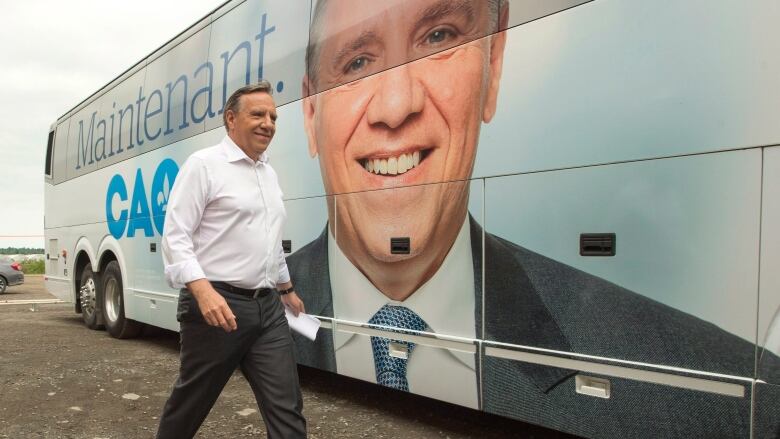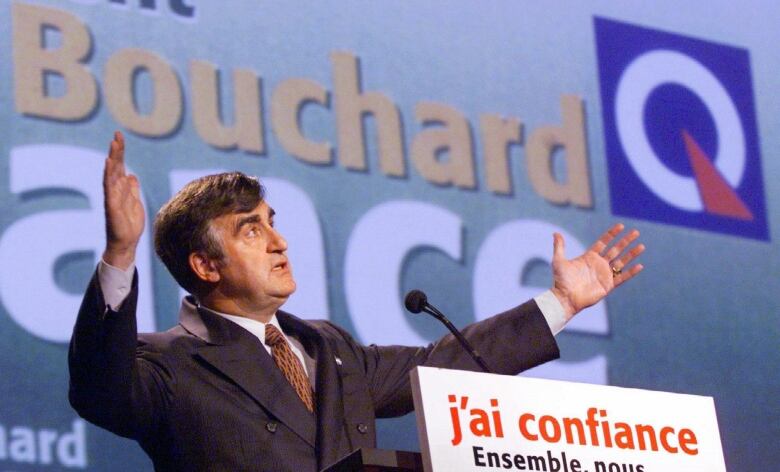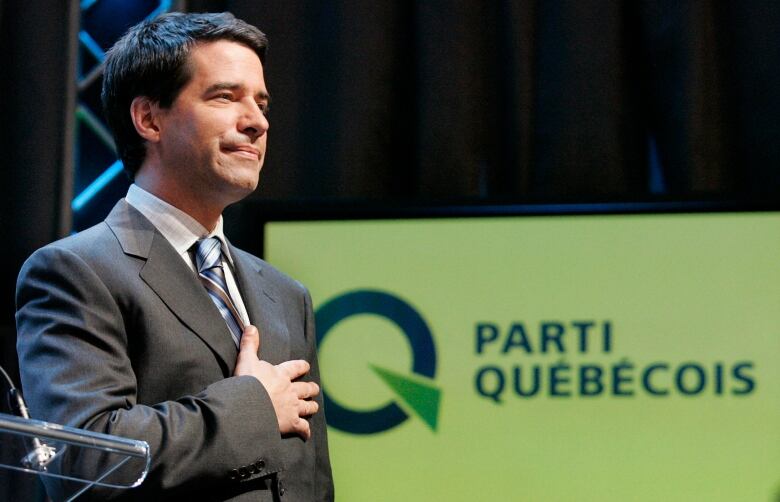How a CAQ majority win in Quebec's election could make history
The party could win a majority government with the smallest share of the popular vote ever

Polls suggest that Franois Legault's Coalition Avenir Qubec could set a new record in theOct. 1 election by forming a majority government with the smallestshareof the popularvote of any majority governmentin the province's history.
It's the kind of thing that could rewritethe conventional wisdom on electoral politics in Quebec.How much of the vote does a party really need to have a good shot at a majority?
We may be about to find out. As of Aug. 29, whenCBC'sQuebec Poll Trackerwas last updated, the CAQhad an 81 per cent chance of winning a majority in an election held immediately even though the party is estimated to have just 36.6 per cent support.
Of the five pollsters who have reported survey results since the campaign kicked off, four have pegged the CAQwithbetween 32 and 38 per cent support. (The outlier was Forum, registering the CAQ's supportat 42 per cent.)
Using the Poll Tracker's seat projection methodology, the most likely outcome, if each of these polls' results were replicated on election day, would be at least 63 seats for the CAQ the minimum threshold required for a majority government.
No party has won a majority government in Quebec with less than 38 per cent of the vote and only once did a party manage it with less than 40 per cent of ballots cast.
Is CAQthe heirtoUnion Nationale?
The record-holder is the Union Nationale under Maurice Duplessis, which captured 38 per cent of the vote and 48 seats in the 1944 election, putting it just over the majority threshold in what was a 91-seat legislature atthe time.
But even that election result wasrather anomalous. Adlard Godbout'sLiberals won the popular vote with 39.4 per cent, but fell short with just 37 seats. The reason thenwas the way in which Liberal and UnionNationalesupport was distributed in the province a distribution not entirelydissimilar to how support for the Liberals and the CAQ is breaking down regionally (and linguistically) today.

The 1944 election had a smaller nationalist party on the ballot in the Bloc populaire (a party opposed to conscription during the Second World War) which won 14.4 per cent of the vote and four seatsand an even smaller left-wing party in the provincial wing of the Co-operative Commonwealth Federation, which took one seat and 2.6 per cent of the vote.
It's an electoral landscape that doesn't look very different from the one in Quebec today. And the historical precedent is a positive one for Legault: the UN governed for 16 years after the 1944 election.
Francophone vote key to CAQ majority hopes
So the CAQ is in a position to win a majority government with a historically low share of the popular vote and could even secure more than 63 seats with even less support than itcurrently enjoys because of its dominance among francophones, who make up at least 65 per cent of the population in 100 of Quebec's 125 ridings.
According to the Poll Tracker, the CAQ has the support of 41 per cent of francophones. More importantly, it puts the party 19 points ahead of the PartiQubcois and 21 points ahead of the Liberals among francophones. Since the CAQ isn't facing stiff competition for its core francophonevote, ithas the edge in many ridings across the province.
That core vote was key to the PQ's majority victories in 1994 and 1998the last elections in which a party other than the Liberals won a majority. Despite only besting the Liberals by 0.4 percentage points in 1994 and being bested by the Liberals by 0.7 points in 1998 the PQ won comfortablemajorities in those elections thanks to its unrivalled edge among francophones.

A poll conducted by CROP at the end of the 1994 campaign gave the PQ a 14-point lead over the Liberals among francophones. In 1998, a survey by SOMconducted mid-campaign put the PQ's edge among francophonesat 18 points.
In both elections, there was no major third party to split the francophone vote. Mario Dumont'sADQ, the predecessor of the CAQ, took just 6.5 and 12 per cent of the vote in 1994 and 1998.
The PQ could have won a majority even with a much smaller share of the popular vote, thanks to this advantage among francophones. Its victorieswere not near-run things: the party finished with a majority cushion of 14seats in 1994 and 13seats in 1998.
What's the magic number for a minority?
A Lger poll published last week suggested that Quebecersbelieve the most likely outcome of the election is a minority government. That might not be an unreasonable assumption, asthe CAQ is wellbelow that 38 per cent historical threshold.
But Quebec doesn't have a lot of experience with minority governments. In fact, the province has elected minority governments only twice since the beginning of the 20th century.
And those two campaigns didn't look much like the one happening today. In 2007, Jean Charest's Liberals took just 33.1 per cent of the vote and finished only 2.3 points ahead of the ADQ. In 2012, the PQ under Pauline Marois had just 31.9 per cent of the vote and a razor-thin margin of 0.7 points over the Liberals.
More important, perhaps, is the fact that in both of those elections, the third-place finisher was not far behind: 28.4 per cent for the PQ under Andr Boisclair in 2007 and 27.1 per cent in 2012 for the CAQ in Legault's first campaign as leader.

Today, the PQ underJean-FranoisLise is in third place with only 18.4 per cent support not enough to make a significant impact.
It would take more than just a slip in CAQsupport down into the low 30sto push the party into minority territory. It also probably would require an increase in support for the Parti Qubcois, one that would move enough seats into the PQ'scolumn to drop the CAQ below the 63-seat majority threshold.
It's a complicated electoral calculus, combining the CAQ's support among francophones, its lead over the Liberals and the margin between the first and third place parties. All of these variables canchange between now and Oct. 1 but if the numbers hold steady, the math looks good for Legault's shot at making history.












_(720p).jpg)


 OFFICIAL HD MUSIC VIDEO.jpg)
.jpg)



























































































